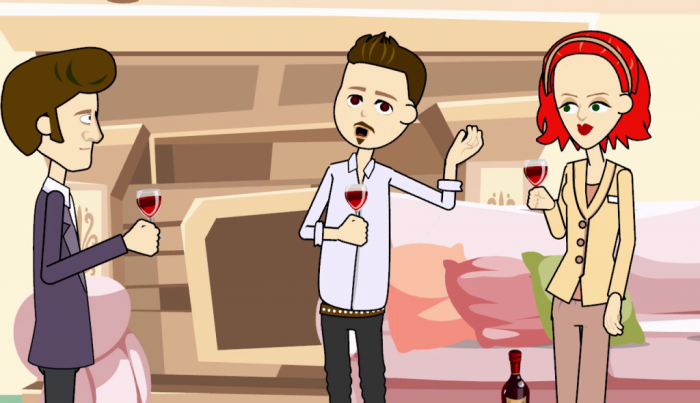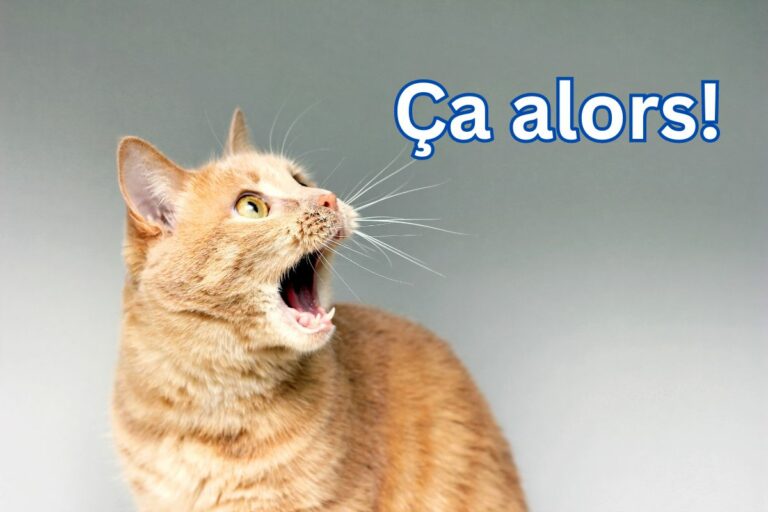The Best French Expressions For Love & Dating (great audio examples)
They say France is a romantic soul's dream... Makes you want to fly to Paris in a quest for love, with as a backdrop the Champs Elysée and Eiffel tower ...
But how do the real French actually feel, and talk, about love ? Are they as romantic as in the movies and novels ?
Most of them aren’t. Like everywhere else, things have changed. Life is faster. Cost of living is rising. The French need to work hard to pay the rent. They live with Google. Facebook. Uber. Meetic.
I don't mean to burst your romantic bubble. But let’s face it, even love has changed in France.
And so have French expressions for love.
Sure, the French language carries a wonderful romantic heritage. But it’s now heavily influenced by external cultures and languages such as English and Arabic.
So what are the most common phrases and expressions the French use when talking about love nowadays ? Read on to discover some of the all-time as well as newest and coolest French love phrases and the best words to express feelings of love in spoken French.
Whatever your style as a lover girl or boy, there’s probably something in there for you to use one of these days !
French expressions for love : the basics
Let’s start with a big classic, the mother of all French love phrases, something most people, including those NOT learning spoken French, know about : “Je t’aime”
Heard in countless movies, read in countless books. It’s hard to talk about love in spoken French without saying it at one point of another.
This is what a traditional “je t’aime !” sounds like :
Now here’s a more down to earth version :
The mere fact of adding “tu sais” at the end makes it much less dramatic. It becomes sort of a reminder, a reassurance that you still love her after all this time.
(Note : in the rest of this post, I use as an example a man talking to a woman, but everything is obviously applicable to a woman talking to a man, or two persons of the same sex).
Let’s hear another variant, “Je t’aime à la folie” :
That’s even more dramatic than the original “je t’aime”. You’re crazy for her. “Je t’aime à la folie” is almost as much of a classic as “je t’aime” itself.
“Je t’aime plus que tout” has perhaps less passion and insanity, but more true love and care
You might equally say it to someone you’ve recently met or to someone you’ve known for a long time. Again, it’s somewhat less passionate, but perhaps more durable and stable.
“Je t’adore” is another well-known French phrase for love. The way you pronounce it will determine the level of either crazy passion or just plain friendly affection you feel for the person.
If you say :
You are likely passionately in love. But if you say :
It probably shows you’re very fond of the person, like a friend dear to your heart.
Here’s another one : “Tu es l’amour de ma vie”, a passionate thing to say, the stuff romantic movies are made of :
It’s a phrase that’s found abundantly in love books, songs and films. I’ve included it in this repository of French phrases for love because you might some day choose to utter these words.
Beware though : this is powerful stuff, so make sure you pick the right occasion. And the right person.
French expressions for love : crushes
Let's start with “Tu me plais”, which is roughly equivalent to “I like you”. As such it may denote physical attraction, but not always. Again, it really depends on the way you say it :
Saying it in the sense of physical attraction is a direct and risky proposition. Make sure you correctly assess the person’s reaction before you jump in...
“Je t’aime bien” is much less risky, as it can mean several things. It may just indicate you’re fond of her as a person. You could even say it to a colleague you see everyday.
But it may also be a conservative manner of expressing something deeper. Like if you’re an introverted person painstakingly revealing a secret feeling.
“J’ai un faible pour toi” is a soft, superficial, non-committing way of admitting a small crush in spoken French. It’s often used when talking about someone else, such as when you’ve noticed someone has a crush on someone :
A slightly stronger expression is “il en pince pour elle” :
Here we’re talking about a bigger crush than juste “un faible” (a weakness). It calls to mind images of someone constantly thinking about the person and doing everything he can to get close to her (or on the contrary to avoid her).
Just like “je t’aime bien”, “Je t’apprecie beaucoup” is double-faced :
It may indicate plain fondness, but you can also use it to express deeper romantic interest without overly exposing yourself. Tone of voice, eye contact, body gesture will help her distinguish the true nature of what you’re expressing.
French expressions for love : hip talk
Nowadays , “Je te kiffe” is used a lot by young - and young at heart - French speakers in romantic context. “Kif” is an arab word for North African marijuana, and “kiffer” has become a spoken French verb that basically means getting high.
So what you’re telling the person is that he or she’s making you high. It could probably translate to something like “I dig you” in colloquial English.
A word of caution, only use this “love” phrase if you’re a young person or have a young and hip enough style. Otherwise you may come across as an immature or insecure person trying to be cool.
Speaking of cool, “t’es trop cool” is another example of youth talk. Actually, any sentence that unduly includes “trop” (too much) typically has a youngster connotation in spoken French nowadays.
Why is that ? As the French population of North African descent has kept growing over the last decade, the French language has been influenced by lots of words, phrases and constructs used by the arab community.
Using “too much” instead of “very much” is one such constructs. And it’s made it’s way into the mainstream language.
So nowadays, French kids and teens (and many adults as well) use “trop” (too much) as a superlative. “T’es trop cool” really means “tu es très cool”.
Another very common example is “c’est trop bien !”, which literally means “it’s too good” but is really meant to say “it’s awesome”.
But I digress… Let’s move on to the next expression :
“Tu me fais flipper” : this French "love phrase" is not really specific to love talk, it means something like “you drive me nuts”.
Note that you may also use it when somebody announces to you something that really stirs you up.
A more “grown up” version of it would be the French love phrase “tu me rends fou/folle” or “tu me rends dingue”, which would translate to “you drive me crazy”. Crazy love indeed...
Note these latter versions can also be used in other contexts than love talk, just like in English. However if you say “tu me rends dingue” to someone while looking at them straight in the eyes, what you mean by that is likely to be clear to her !
French expressions for love : dating
“Tu veux sortir avec moi ?” Just like in English, “sortir avec” (go out with) often refers to a date, or by extension to an ongoing romantic relationship.
“On sort ensemble depuis 2 semaines” : [on sort ensemble depuis 2 semaines]
Another way of saying you are in a relationship is to say “on est ensemble”
A traditional but perhaps less engaging dating proposition is “tu veux dîner avec moi ?”
By default the person will probably think you’re asking her on a date, so if that’s not your intention you need to provide some additional clarifications about how, where and why.
Like in other languages, asking someone out to dinner carries less commitment than asking someone to go out with you in an general sense - basically asking to start an ongoing relationship.
French expressions for love : words to express feelings
Now let’s turn to how you declare your passion to someone using spoken French love phrases.
The most obvious and straightforward approach is to say “je suis amoureux de toi” (amoureuse if you’re a woman) :
Here, you’re outright telling the person you’re in love with them.
A more subtle approach would be to say “je t’aime beaucoup”. This again might raise some questions about the nature of your feelings - do you love the person as a friend or as a lover.
Here as well, it’s the signals you send through the tone of your voice and your body language that will help the person figure it out :
You might also say “tu me fascines”, a phrase that leaves little doubt as to your feelings. Admitting your fascination with a person will often come across as more than simple friendship.
Likewise, “je n’ai jamais connu quelqu’un comme toi” is quite a romantic phrase to say.
“J’ai des sentiments pour toi” is even more direct, more or less equivalent to “je suis amoureux de toi”.
Another way to say it is “je ressens quelque chose pour toi”, I feel something for you :
“je ressens quelque chose pour toi”
French expressions for love : physical attraction
when you say to someone “tu me fais de l’effet”, you’re letting them know you’re physically attracted to them. The phrase literally means “you have a strong effect on me” :
A more blunt way to say it is “tu m’excites”. When saying this you’re clearly entering the sexual realm, it’s like saying “you turn me on” :
Only say it if you know the person intimately, or if you really know what you’re doing ...
Another French love phrase often used when talking about someone you’re attracted to is “je n’en peux plus pour elle”. It expresses strong attraction and a dose of frustration associated with that :
Typically, you won’t say that to the person herself ("je n’en peux plus pour toi") because it might make you sound a bit pathetic with an unfulfilled burning desire.
Of course, the most direct and brutal approach to revealing your attraction is to say “je veux passer la nuit avec toi”, telling her outright you want to spend the night with her :
Again, use this phrase at your own risk, if you don’t know what you’re doing, be ready for unexpected results such as her walking off or being offended ...
French expressions for love : in a relationship
So you’ve met your loved one and are now in a relationship. Let’s look at some common love phrases the French typically say to their sweetheart.
“J’ai besoin de toi” (I need you) is typically used to show your feelings for the person are still as strong as in the beginning :
“Je pense toujours à toi” lets the person know she’s always on your mind. Assuming your feelings are shared, she should be very happy to hear this once in a while.
“Je veux être avec toi” expresses that you long to be with her at all times, time away from her is painful to you.
Another way to express this feeling of longing is “tu me manques” (I miss you).
“Je suis bien avec toi”, or “je me sens bien avec toi” indicates how happy you feel when the two of you are together.
“Veux-tu m’epouser ?” is your standard marriage proposal. Here again, I certainly hope you know what you’re doing.
“Embrasse moi idiot” (or just plain “embrasse-moi!”) needs no explanation. Probably one of the most romantic phrases ever.
An alternative to “embrasse moi” is “serre-moi dans tes bras” or “prends moi dans tes bras”. These are typically used to express feelings of love rather than mere physical attractions.
“Tu m’aimes ?” is usually asked by a lover in need of reassurance. I would warn against answering “non”, whatever your true feelings are.
French expressions for love : rejection
So far in this review, we’ve looked at the things of love with rose coloured glasses.
Unfortunately, rejection is also a fact of life. So, now that we've talked about all these nice French love phrases, let's take a peek at the dark side of the (honey)moon.
“T’es pas mon genre” (you’re not my type) can be quite harsh to hear when you’re trying to seduce someone :
In some cases, however, it is not meant as a definite “no” and if you’re brave enough, you may want to give it another shot.
“Ça va pas non ?” is more radical, more of a definite “no”. It literally means “are you crazy ?” Probably the ultimate rejection phrase.
“Désolée je suis pas libre” suggests the person is already in a relationship. A softer way to reject your proposition. It’s not you, it’s her ...
A similar way to say this is “je suis déjà maquée”, which means “I already have a boyfriend / girlfriend” . “Maqué” is derived from the word “mac” or maquereau, which is French for "pimp". A disrespectful way of alluding to a someone in a relationship (including oneself). “Maqué” can also refer to someone who has a girlfriend, e.g. “il est maqué”.
“Je suis avec quelqu’un” is a more delicate way for her to say she's already involved in a relationship :
That's all for now
So now you know (almost) everything there is to know about love phrases and expressions in spoken French. You’re ready to go out there and seduce men or women, go out on dates, get into relationships, and (hopefully not) get rejected.
If you think I’ve left out some important love phrases in French, or if you have questions or remarks about the ones I’ve mentioned, drop me a line in the comments. Until then, I wish the best of luck for your French love life.









Awesome post, Thanks for this! Expressing your love is important not just because it helps you become a better person, but also because it allows you to establish strong and honest relationships with other people.
Read my blog about the The Importance of Expressing Your Love
Hope this will also help, Thank you!
Pretty nice post. I simply stumbled upon your blog and wished to say that I have really loved surfing around your weblog posts.